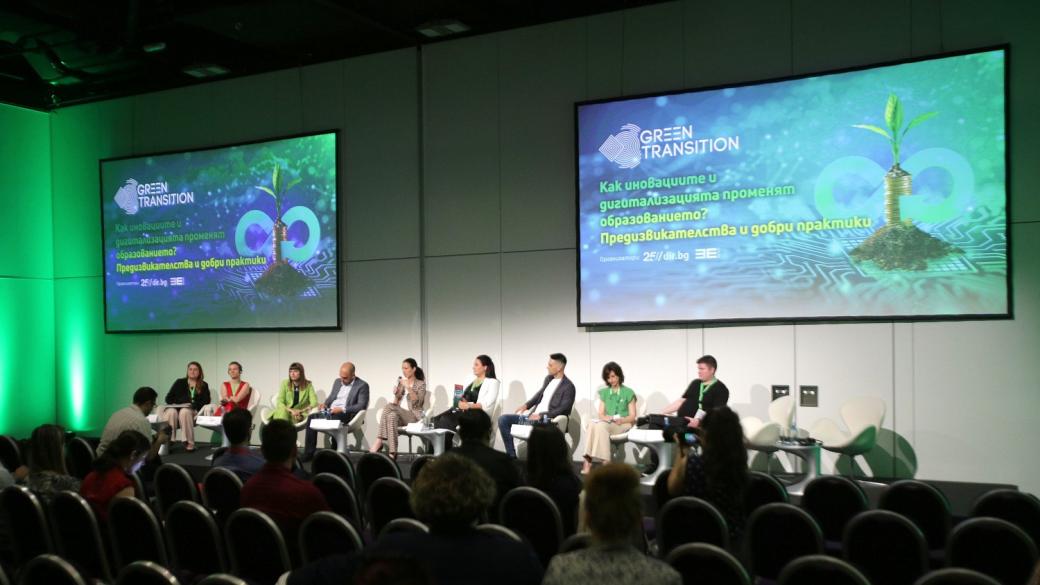The latest edition of the Green Transition Forum has become a conversation about the future that everyone wants to participate in. The conference, organized by the Dir.bg portal, took place in the period 20 – 22 June, with a record number of participants in Sofia, as experts talked about green policies and energy. 184 panelists from Bulgaria, Romania, Greece, Slovakia, Slovenia, Albania, Kosovo, Serbia, Poland, Croatia, France, Portugal, the Republic of North Macedonia, Azerbaijan, Moldova, the UK and Canada took part in the panel discussions, and more than 2,500 people attended it live, the organisers said.
According to them, this is a clear sign that Bulgaria can be an unavoidable factor with a vision, approach and proposals for the transition. This year’s event aimed and succeeded to go beyond national boundaries and expand the regional discussion on the future and policies that can make the green transition sustainable and successful for businesses and people.
The forum brought together in Sofia representatives of the European Commission and the European Parliament, leading politicians and ministers from Bulgaria and the countries of the region, key figures from the EIB, IMF, development banks from CEE, industrial companies, participants from business and local government, experts, employers and trade unions, universities, academia, NGOs and media.
The inspiring speakers at Green Transition 2023 were Ivan Krastev, researcher at the Institute for Humanities and Social Sciences in Vienna (IWM Vienna), IMF Regional Representative for Central, Eastern and Southeastern Europe Jeff Gottlieb and Harvard professor and co-author of the bestsellers “The AI Republic” and “Understanding How the Future Unfolds” Dr. Mark Esposito.
On the first day, the focus was on energy and its key role in the transition. Participants from across the region debated important topics such as energy independence in the Balkans, energy connectivity, the potential of energy storage systems, renewable energy and the future of baseload power plants. A special discussion on COP 29 sent the message that even if Russia blocks Bulgaria’s hosting of the global climate meeting, COP 29 should have a strong focus on Central and Eastern Europe. According to Environment and Water Minister Yulian Popov, “Eastern European countries will have a very serious place in the climate negotiations” and “Bulgaria is one of the countries in the EU that is leading in solar engineering.” The topic “How to make the Green Transition fair for all?” was also commented by leading politicians, experts and trade union representatives.
Green Transition 2023 also set itself the ambitious task of holding a roundtable on Bulgaria’s energy vision and strategy. It was there that the key discussion on the development of the sector emerged and the views of policy makers, businesses and experts were heard, outlining the direction of the energy sector for decades to come.
The focus of the second day was on sustainable finance, circular economy and decarbonisation. Bankers and leading experts from European and Bulgarian financial institutions commented on the best options not only for financing, but also for innovation, circular economy and sustainable use of resources.
In the parallel sessions of the forum were heard recommendations that green investments should be made wisely and supported by the state, the topic of green building and the European Bauhaus was commented. These policies cannot do without new technologies, ESG norms, circular economy and decarbonisation.
A highlight of the second day of the forum was the hot discussion on innovation, artificial intelligence, deep technology and digitalization in education. Minister of Innovation Milena Stoycheva stressed that her ministry supports green investments and a procedure for the circular economy worth 180 million BGN is to be announced.
A green transition without transport connectivity and green mobility is also unthinkable. The topics were discussed during the third day of the Green Week 2023 event. Minister of Transport Georgi Gvozdeykov took part in the discussion on sustainable options for transport security and vehicle electrification together with key representatives and industry experts. He stated that over the next 7 years in Bulgaria more than 1.5 billion BGN will be invested in policies related to transport security, which are important for improving the climate and implementing green policies. Within 4 years, electric cars will displace conventional cars, top industry experts said.
A key element in the discussion were the topics of smart green cities, cybersecurity and digitalization. Minister Aleksandar Iolovski announced an alarming statistic that as of last year only 31% of the working age people in Bulgaria are digitally literate, and the target is to have them at 80% by 2030. He noted that our country is now in the penultimate place in Europe in the index, which measures digital technologies in the economy and society, but also said that the native IT sector gives us a strong position to catch up.
Sustainable agriculture issues were also a highlight of the day, along with the opportunities offered by the agritech sector. And this is particularly important for all of us, because every day we need to remind ourselves that we live on a planet with limited resources, which we need to use properly. Farming is no longer just about maximising yields per acre, it is a modern sector that works for people and protects biodiversity. All this must happen at an affordable price for people. The discussion was joined by the Ministers of Agriculture of Bulgaria and North Macedonia, Kiril Vatev and Ljupcho Nikolovski.
The conference became a catalyst for the processes and a platform for dialogue on the challenges and opportunities that the Green Transformation poses to institutions, businesses, governments and citizens of European countries.
